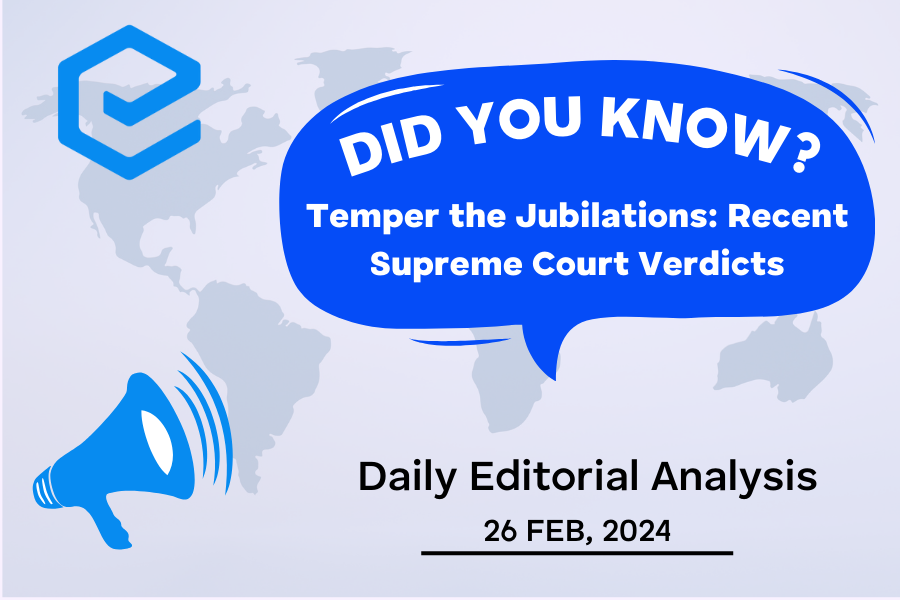
The recent Supreme Court verdicts have undoubtedly elicited jubilations from various quarters, particularly among those whose interests align with the outcomes. However, it is imperative to temper this jubilation with a sober recognition of the complexities inherent in judicial decisions. While celebrating victories in the courtroom, it is crucial to remember that these verdicts are often subject to interpretation, appeal, and implementation challenges. Moreover, the impact of these decisions extends far beyond immediate stakeholders, influencing legal precedent, societal norms, and governance frameworks. Therefore, while acknowledging the significance of recent rulings, it is essential for all stakeholders to maintain a nuanced understanding of their implications and continue engaging in constructive dialogue to uphold the principles of justice and equity.
Tag: GS-2 Polity
Contents
- 1 Evaluating the Supreme Court’s Balancing Act
- 2 Conclusion
- 3 Frequently Asked Questions (FAQs)
- 3.1 1. FAQ: Why should we temper our jubilations over recent Supreme Court verdicts?
- 3.2 2. FAQ: Does celebrating recent Supreme Court rulings imply overlooking potential complexities?
- 3.3 3. FAQ: How can recent Supreme Court verdicts impact society beyond immediate stakeholders?
- 3.4 4. FAQ: Is it enough to simply celebrate favorable Supreme Court verdicts?
- 3.5 5. FAQ: What should stakeholders do in response to recent Supreme Court rulings?
- 4 In case you still have your doubts, contact us on 9811333901.
In News:
The Supreme Court’s recent rulings, deeming the electoral bonds scheme unconstitutional and upholding AAP’s victory in the Chandigarh mayoral race, are celebrated as positive strides for electoral democracy.
Evaluating the Supreme Court’s Balancing Act
Analysis of Judicial Responsibility
- The Supreme Court of India, as the apex judicial body, holds the crucial role of interpreting and preserving the constitution.
- It engages in a delicate balancing act, navigating complex executive decisions while safeguarding its own legitimacy within the constitutional framework.
Importance of Legitimacy
- Maintaining equilibrium is vital to prevent the antagonization of the executive, preserving the Court’s legitimacy.
- The Court acknowledges that a collapse in legitimacy could undermine the foundations of the constitutional order it seeks to protect.
Challenges in Balancing Against the Executive
- Dual Role Dilemma
- The Court juggles its dual role as a legal arbiter and guardian of constitutional values.
- Balancing act becomes intricate when faced with executive actions challenging constitutional principles.
- Limitations – Facade of Constitutionalism
- The Court’s caution in confronting the executive should not overshadow its commitment to upholding constitutional values.
- Concerns arise when the Court leans more towards preserving a facade of constitutionalism over assertiveness.
- Upholding Principles Amidst Executive Power
- Recent decisions, while positive, prompt questions about the Court’s consistent commitment to challenging executive power.
- The delicate equilibrium must not compromise robust defense of constitutional principles.
- Political Culture, Public Sentiments, and the Court’s Role
- Divergence of Legal Decisions and Public Sentiment
- Despite legal decisions challenging government initiatives, there’s a disconnection between legal pronouncements and public sentiment.
- Normalisation of Institutional Degradation
- Lack of public outrage suggests a troubling acceptance of institutional degradation.
- Aestheticization of Politics
- Political events are viewed as entertainment rather than significant indicators of institutional trustworthiness.
- Divergence of Legal Decisions and Public Sentiment
Courts’ Role in Shaping Political Culture
- The Court operates within a socio-political environment where the gravity of issues may be overshadowed by a superficial engagement with political developments.
- The Court’s impact on shaping political culture is constrained by the broader context of institutional degradation.
Way Forward
- Urgent need for civic courage, critical thinking, and holding the government accountable.
- Critical examination of institutional roles in maintaining genuine accountability is imperative.
Conclusion
- Recent Supreme Court decisions should be cautiously viewed within the larger context of institutional degradation.
- Challenges in balancing legitimacy, fragmented opposition, and the normalisation of institutional degradation must be addressed.
- Public reception and the Court’s unwavering commitment to constitutional values will determine the true impact of these decisions on Indian democracy.
Source: IE
Frequently Asked Questions (FAQs)
1. FAQ: Why should we temper our jubilations over recent Supreme Court verdicts?
Answer: Temperance is essential because while verdicts may seem definitive, they can be subject to interpretation, appeal, and implementation challenges, requiring a nuanced understanding of their implications.
2. FAQ: Does celebrating recent Supreme Court rulings imply overlooking potential complexities?
Answer: Yes, celebrating victories is important, but it’s crucial to acknowledge the inherent complexities in judicial decisions, which may have far-reaching consequences beyond immediate outcomes.
3. FAQ: How can recent Supreme Court verdicts impact society beyond immediate stakeholders?
Answer: Verdicts influence legal precedent, societal norms, and governance frameworks, shaping the trajectory of justice and equity for generations to come.
4. FAQ: Is it enough to simply celebrate favorable Supreme Court verdicts?
Answer: No, maintaining a nuanced understanding of verdicts’ implications and engaging in constructive dialogue is vital to ensure their effective implementation and uphold the principles of justice.
5. FAQ: What should stakeholders do in response to recent Supreme Court rulings?
Answer: Stakeholders should celebrate victories while remaining vigilant, critically analyzing verdicts’ implications, and actively participating in discussions to address any challenges or disparities that may arise.
In case you still have your doubts, contact us on 9811333901.
For UPSC Prelims Resources, Click here
For Daily Updates and Study Material:
Join our Telegram Channel – Edukemy for IAS
- 1. Learn through Videos – here
- 2. Be Exam Ready by Practicing Daily MCQs – here
- 3. Daily Newsletter – Get all your Current Affairs Covered – here
- 4. Mains Answer Writing Practice – here

